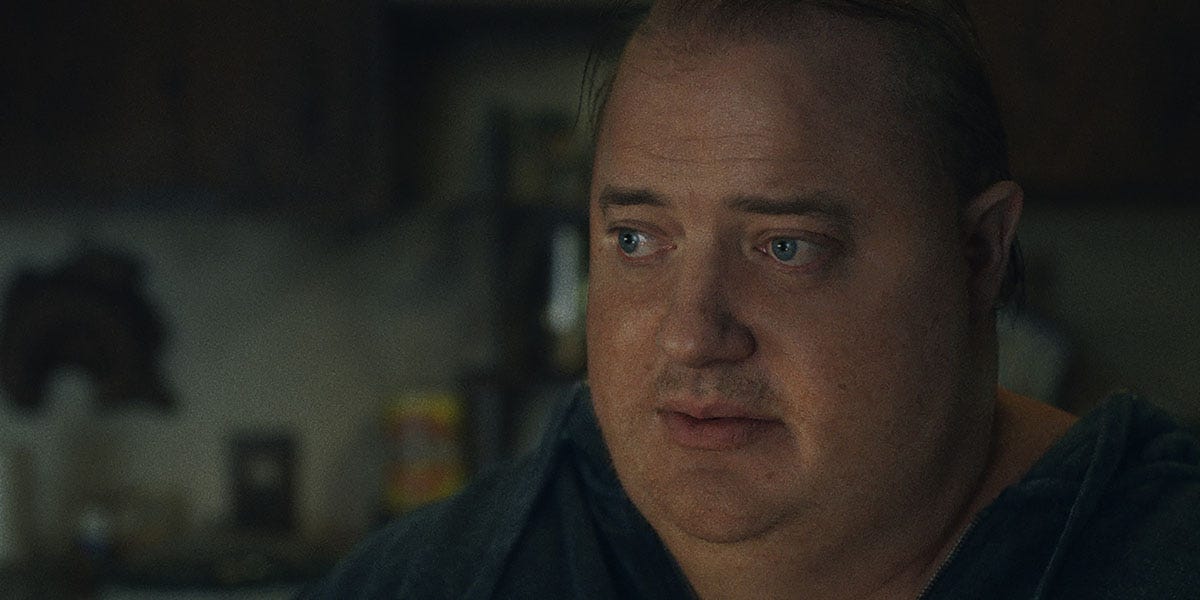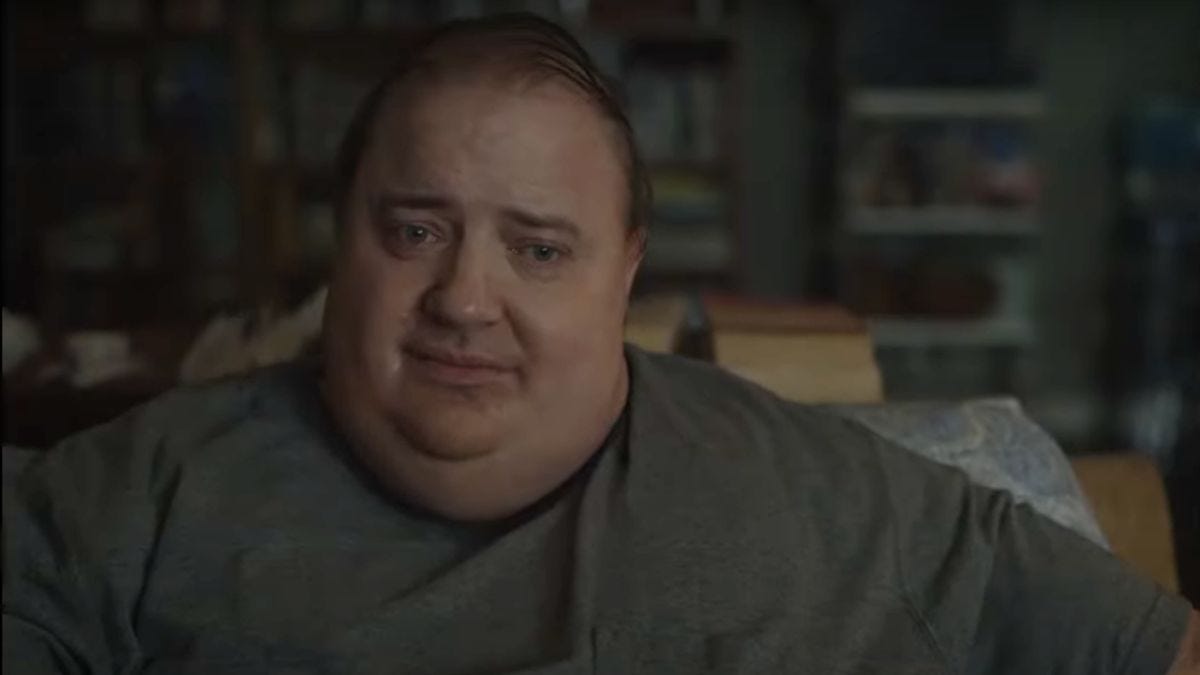The Whale (2022)

Movie rating: 9/10
The Whale is a tough film to watch. Directed by Darren Aronofsky and written by Stephen D. Hunter adapting his own stage play, the film stars Brendan Fraser as Charlie, a reclusive, morbidly obese English teacher on the verge of death who tries to reconnect with his teenage daughter Ellie (Sadie Sink). Supporting characters include Liz (Hong Chau), Charlie’s nurse and only friend, and Thomas (Ty Simpkins), a young missionary who becomes a frequent visitor at Charlie’s apartment.
First and foremost this is a showcase for Fraser, who is deservedly being spoken of as a frontrunner to win the Academy Award for Best Actor. My fondest memory of Fraser is his matinee idol turn as adventurer Rick O’Connell in The Mummy, a role that couldn’t be more different from his astonishing performance in The Whale. What stands out most about his work here, aided by effective use of prosthetics and makeup, is how Fraser allow us to look past the state Charlie has allowed himself to fall into, and to see the person underneath.
Ashamed of his appearance, Charlie keeps his webcam turned off when teaching his online classes. We first see him on a couch masturbating to pornography, and his heart almost gives out right then and there when Thomas opens his unlocked door. Yet Fraser’s impassioned lesson to his students and sympathetic eyes let us understand the core of who this person is: someone who fundamentally believes in the capacity of everyone for good. “Do you ever get the feeling that people are incapable of not caring?” he asks Liz at one point. “People are amazing.”
That quality is notable for a few reasons. Charlie himself has hurt others in the past, most notably Ellie—whom he hasn’t seen for eight years—and her mother Mary (Samantha Morton). Charlie left them both when he fell in love with a young man, Alan, one of his students. Despite Charlie’s efforts to stay in touch with his daughter, Mary won full custody of Ellie and discouraged contact. Meanwhile, Alan’s tragic death sent Charlie into a downward spiral of binge-eating.
Understandably, when we meet Ellie she is angry at her father for walking out on them. She acts in often cruel ways to Charlie, berating him and agreeing to spend time with him only because he will pay her and rewrite a school essay for her. But then, this is the first time she has seen her father since she was a little girl. Charlie left his wife and child for Alan and has now completely let himself go, to the point where he will not leave his apartment and cannot even stand unsupported.
We know why Ellie is angry at the world and everyone around her. As she tells Charlie, he taught her a vital lesson when he left her: “People are assholes.” Charlie still sees the good in her, no matter how much she insults and mistreats him in return. Acknowledging how much he hurt his family, it seems as if Charlie’s greatest struggle is trying to find the good in himself. Of his attempts to support Ellie, he says, “I need to know that I have done one thing right with my life.”
There’s been some criticism of The Whale for its portrayal of obesity and allegedly reinforcing anti-fat stereotypes. I totally disagree. This is not a blanket condemnation meant to represent all fat or obese people. This is a character study about one man so devastated by loss and guilt that he consoled himself with binge-eating to the point where he has become almost unrecognizable and shut himself off from the world; a man who, despite seeing the potential in everyone for good, no longer seems to have the will or interest to save his own life. “I’m sorry,” he constantly tells everyone. He may be apologizing just as much to himself.
Yes, there are scenes of Charlie gorging himself on fried chicken and pizza—usually after he has faced an unexpected challenge, like someone new seeing him when he did not wish to be seen. These binge-eating scenes are difficult to endure because we know we’re watching this man slowly kill himself. But isn’t that how addiction works? The same dynamic would hold if we were watching a character destroy themselves through alcohol, drugs, gambling, or any other vice. In this case, it’s junk food. Many of us have bad habits we resort to when life becomes difficult. For those struggling with addiction or compulsive behaviour, this is magnified many times over. It’s rare that we have to watch ourselves at our worst: when we do, that can be a wakeup call. Recall the viral video of David Hasselhoff eating a cheeseburger and berating his daughter while drunk, which he described as evidence of his struggle with alcoholism.
When we see Charlie binging on junk food, when he knows his will likely die within days of congestive heart failure, it’s hard to watch. It should be. And this behaviour is hardly unrealistic for someone struggling with obesity. I recall watching an episode of the reality TV series My 600-lb Life where a patient sneaks fried chicken into the hospital. Problems with binge-eating are something many obese people face. Dramatic portrayal of that is not exploitative or “fat-phobic”. If anything, I think it’s the opposite. We like Charlie, despite what he has done wrong in his family relationships. We know how smart and witty and kindhearted he can be. We want to see him get better. I can’t speak for everyone, but these scenes did not make me feel disgust; they made me feel empathy and heartbreak.
As good as Fraser is here—and this surely represents the high point to date of the “Brenaissance”—he is matched by Chau and Sink. Both give terrific performances. Liz, we learn, shares Charlie’s devastation at the loss of a loved one and is now afraid she will lose Charlie as well. Ellie is smart, but unlikable and abrasive to the point where we come to believe, as her mother does, that she is a bad person. Sink, however, provides just enough glimpses of underlying empathy that we come to understand how Charlie, despite all the abuse she hurls at him, can still see the good in Ellie. Samantha Morton as Mary is engaging when she finally makes her appearance, as we get another perspective on Charlie and his relationship with the family he left behind. Simpkins is fine, though his character ends up being the least interesting; the payoff somehow feels less than it’s built up to be.
Little effort has been made to open up Hunter’s play in terms of its setting, which takes place entirely in Charlie’s apartment. Aronofsky keeps things interesting by letting us see more of it, and by extension Charlie’s life, over the course of the movie. The director is known for dark, harrowing, and downbeat movies like Requiem for a Dream and Black Swan. Certainly The Whale is emblematic of his style. But strangely, despite being about a dying man, this might be one of his most hopeful and sentimental efforts.
The Whale also receives a boost from Rob Simonsen’s fantastic ethereal music. Inspired by a character’s reflection on Moby-Dick—which also informs the title of the film, and which I definitely have to read now—Simonsen incorporates nautical textures with instruments such as the overtone flute and an 1800s pump organ. The score bears classical influences and uses atonality to create a sense of unease, which reflects our growing concern for Charlie. Still, as Simonsen explains, at its core is the same spirit of empathy that guides the film as a whole.
In James Berardinelli’s unfavourable review, I read some criticism about the ending of the film, which he felt was shot in a way that veered on self-parody. All I can say is that wasn’t my reaction, because I was in tears during that last scene. This is a sad movie. But I also agree with Mark Kennedy from the Associated Press that it’s “a film that stays with you and changes you.”
Charlie is a character I was still thinking about long after I left the theatre. That’s a testament to a great performance and a great movie.





